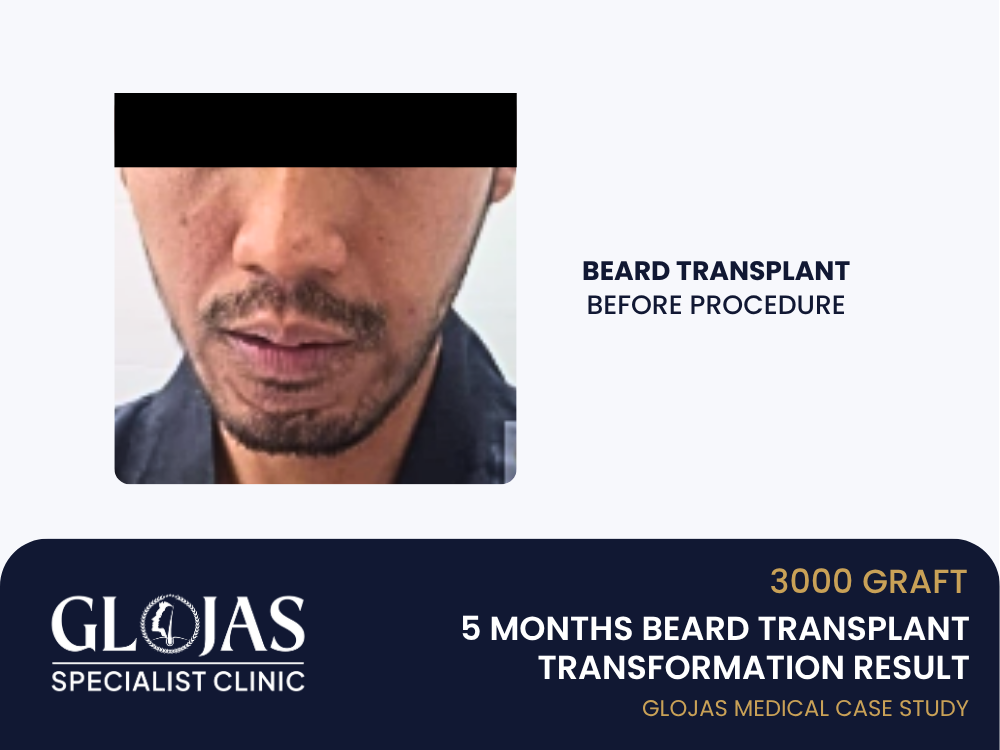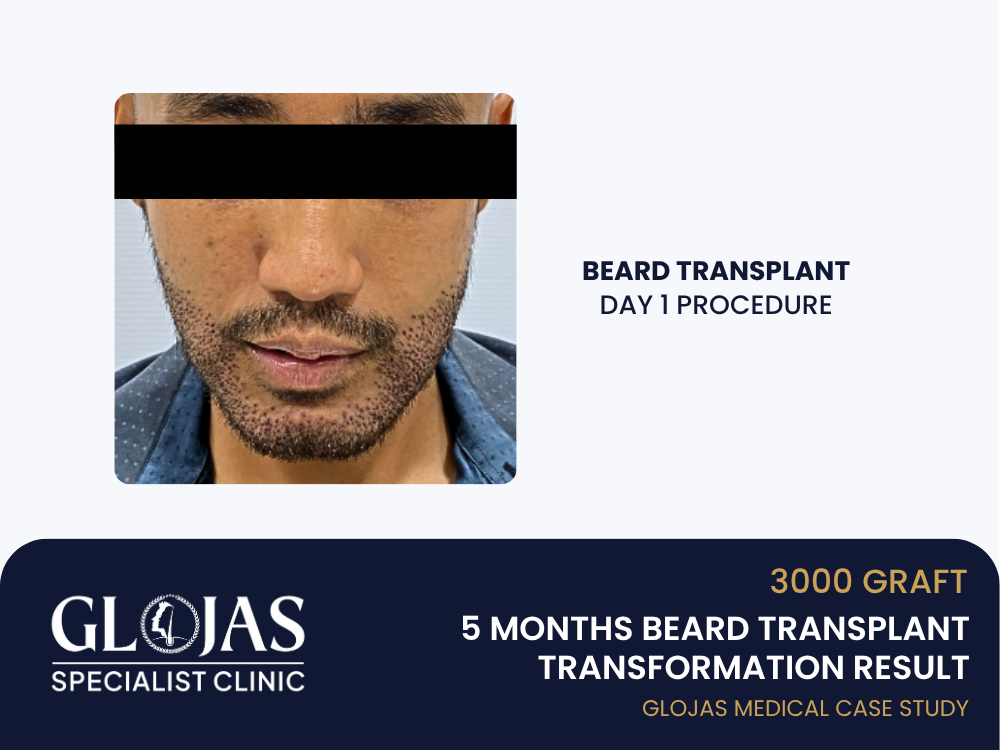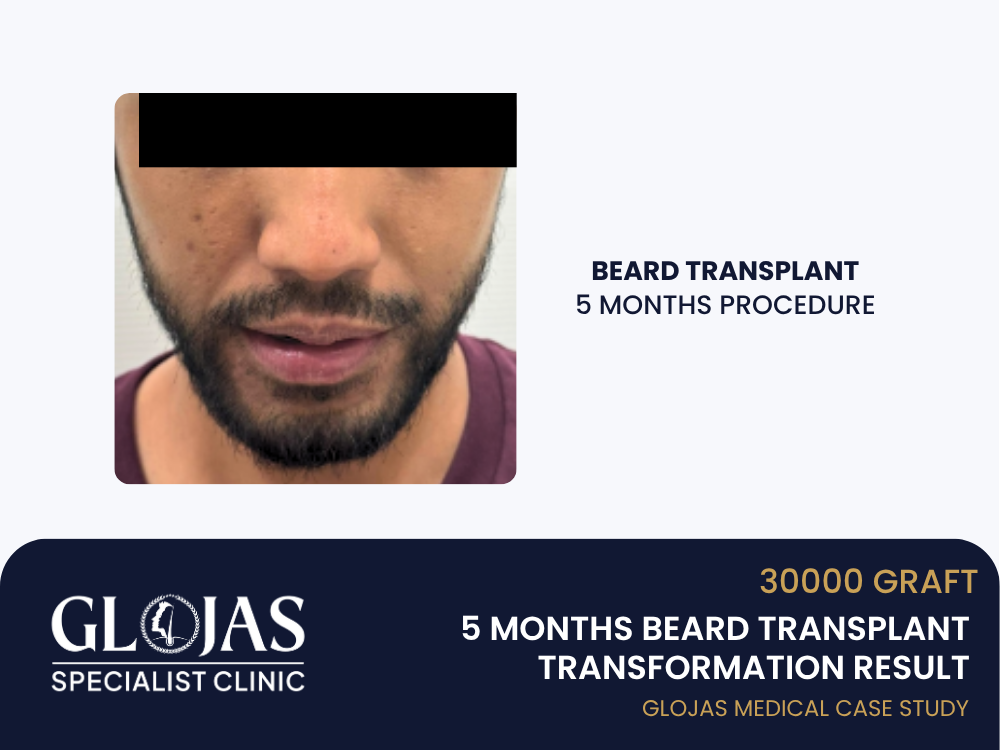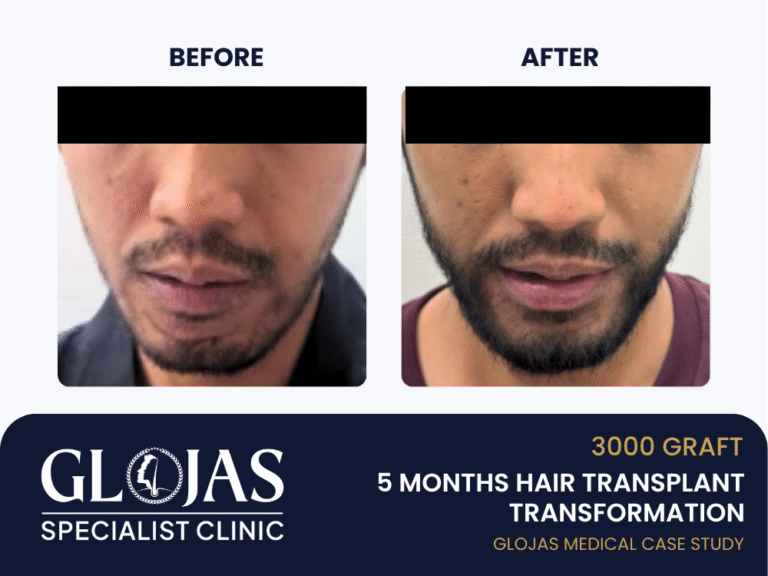Beard trends have evolved from being a fashion statement to a symbol of masculinity and confidence. However, not all men are genetically blessed with a full beard. Patchiness, uneven growth, and thin density can be frustrating, especially when the desire for a well-defined, full beard remains unmet.
In this case, we explore how a 29-year-old male patient transformed his sparse beard into a well-framed, denser appearance using SMART™ FUE Beard Transplant with 3,000 grafts. At just 5 months post-procedure, his early results already show remarkable progress.
Patient Profile
Age: 29
Concern: Thin, patchy beard with uneven growth along cheeks and jawline
Beard Coverage Before: Sparse growth along the sides; minor density under chin and moustache
Desired Outcome: Fuller beard with a stronger jawline outline and even cheek coverage
Medical History: No skin conditions or scarring; healthy candidate for transplant
Why Beard Transplant?
Not all men can grow a thick, consistent beard naturally due to genetics, hormones, or prior skin trauma. For many, SMART™ FUE Beard Transplant offers a reliable and minimally invasive solution to:
Enhance beard density
Improve facial symmetry
Restore confidence
Achieve specific beard styling goals
SMART™ FUE uses advanced follicular extraction and implantation technology, making it ideal for high-precision facial hair design.
Consultation & Planning – Beard Transplant
During the consultation, the patient shared his goal: a fuller, defined beard that connects smoothly along the cheeks, jawline, and chin. He also preferred a natural fade into the moustache.
Key Findings:
Good donor hair density at the occipital scalp
Coarse hair matches the beard texture
Healthy skin with no underlying dermatological issues
Beard Design Plan:
Uniform beard density with slightly higher density on the jawline
Fill gaps on cheeks and under the lower lip
Create soft yet defined beard edges
Estimated grafts needed: 3,000
Procedure Overview

Technique Used: SMART™ FUE
Total Grafts: 3,000
Donor Area: Back of the scalp (occipital zone)
Zones Treated: Cheeks, sideburns, jawline, chin, lower lip, and moustache
Surgery Duration: 7.5 hours (single session)
Anesthesia: Local
Steps:
Donor site trimmed and anesthetized
Hair follicles extracted using a micro-punch tool
Grafts sorted and grouped for strategic placement (single units for outline, doubles for inner density)
The recipient area is mapped and implanted based on the natural beard direction
Post-op bandaging and recovery guidance provided
Recovery & Timeline

The healing process was smooth and relatively pain-free.
| Timeline | Progress |
|---|---|
| Day 1–3 | Mild redness and swelling in the beard zone |
| Week 1 | Scabbing in implanted areas; advised not to shave |
| Week 3–4 | Shedding phase begins (“shock loss” is normal) |
| Month 2–3 | Early regrowth with thin new hairs visible |
| Month 5 | Noticeable thickening, beard shape taking clear form |
By month 5, about 60–70% visible density had developed, with more growth expected in the coming months.
5-Month Results

Though not fully matured, the beard showed significant improvement. The previously patchy areas were now filled in with uniform, healthy growth. The jawline appeared stronger, and the patient was able to start trimming and shaping his beard to preference.
| Before | After (5 Months) |
|---|---|
| Sparse cheek and jawline hair | Even density across cheeks, chin, and jawline |
| Incomplete connection with the moustache | Smooth transition between moustache and beard |
| Thin beard style only | Able to grow and shape a full beard confidently |
Patient Feedback
“I’ve always wanted a beard, but nature didn’t cooperate. Just 5 months after my SMART™ FUE procedure, I can finally shape a full beard. I look better and feel more confident at work and socially.”
Beard Maintenance
The patient was advised to:
Avoid shaving for the first 3 weeks
Use a gentle beard cleanser after 10 days
Moisturize regularly to prevent skin dryness
Avoid harsh grooming or dyeing for 3 months
Consider PRP booster at month 6 (optional)
He resumed basic trimming after 2 months and reported no ingrown hairs or complications.
5 Frequently Asked Questions (FAQ)
1. Are 3,000 grafts too many for a beard transplant?
Not at all. For patients with minimal existing facial hair, 2,500–3,500 grafts are commonly used to create full beard coverage, especially across cheeks and jawline.
2. When will I see the full result?
While initial results are visible by month 5, full density and texture typically develop around 9 to 12 months after the procedure.
3. Does it look natural?
Yes. With SMART™ FUE, each graft is implanted following the natural direction and angle of beard growth, resulting in a realistic, undetectable finish.
4. Is it painful?
The procedure is done under local anesthesia. Most patients experience minimal discomfort and resume normal activities within 1–2 days.
5. Can I shave or style my beard?
You can begin light trimming after one month, and resume shaving or styling after two to three months, depending on the healing process.
Final Thoughts
This case is a strong example of how SMART™ FUE Beard Transplant can effectively restore density and shape in patients with naturally sparse beards. With 3,000 carefully placed grafts, the patient achieved a structured, masculine beard that complemented his facial aesthetics and style preferences.
For men seeking a permanent, low-maintenance solution to patchy facial hair, SMART™ FUE offers high precision, fast recovery, and lifelong results.
